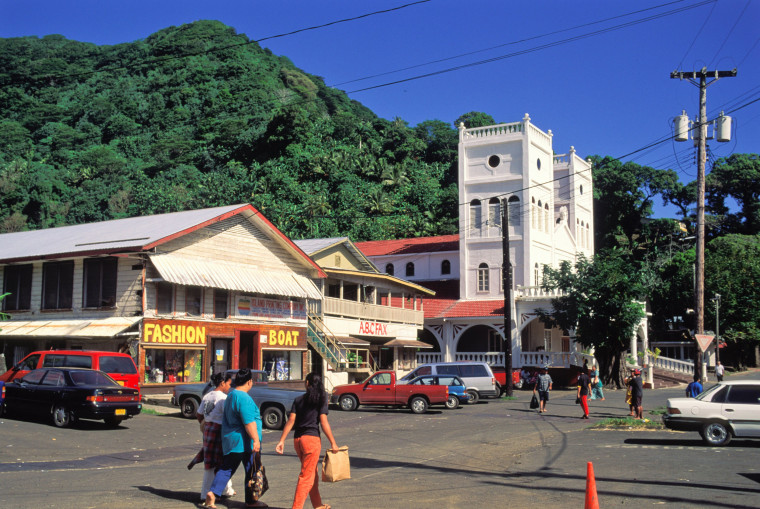Neil Pilcher lives on Tutuila, American Samoa’s largest island, on land his family owns. His neighbors are all relatives. The most important thing for Samoans, he said, is to be in accord with their living environment.
And it’s this Samoan way of life — the land, ownership and inhabitants — that is central to a debate over citizenship. While American Samoa has been an unincorporated U.S. territory since 1900, people born there have never been granted birthright citizenship, unlike the four other U.S. territories — Puerto Rico, the U.S. Virgin Islands, Guam and the Commonwealth of the Northern Marianas.
A federal judge in Utah ruled last Thursday, however, that those born in American Samoa should be recognized as U.S. citizens.
Not everyone, including Pilcher, agrees.
Pilcher, 36, who works as an administration manager at the American Samoa Government, rejects the idea that birthright citizenship will be beneficial for American Samoans, saying that losing their unique status may eventually lead to the loss of their indigenous political system and land rights.
“I live in a house given to me by my father on land that we own as a chiefly clan, what you would call in the mainland ‘family,’” Pilcher said. “All of my neighbors are my relatives/cousins and they live on their chiefly lands. We all live in harmony and look out for one another.”
The case was brought by American Samoans living in Utah, who want rights afforded to U.S. citizens, like access to certain federal jobs and high-ranking military positions, and the ability to run for political office.
American Samoa, in the South Pacific almost 5,000 miles from the U.S. mainland, is made up of seven islands and atolls and has a population of about 55,000. The U.S. territory is politically separate from the islands to the north that make up of the Independent State of Samoa.
Instead of being U.S. citizens, American Samoans are deemed “noncitizen U.S. nationals” and their passports read: “The bearer is a United States national and not a United States citizen.”
To become U.S. citizens, American Samoans living in the states go through an expedited version of the naturalization process that is usually for foreign-born nationals. There are about 180,000 people with Samoan descent living in the states.
"If you are born on U.S. sovereign soil, you are entitled to citizenship,” said Charles Ala’ilima, one of the attorneys representing the plaintiffs in Utah. “Not any kind of lesser right.”
Ala’ilima and other lawyers involved in the case argued that American Samoans should be granted birthright citizenship under the 14th Amendment. The U.S. District Court judge in Utah, Clark Waddoups, agreed with this argument in his ruling, but before new passports were issued he put the case on hold so that it can work its way through the court system on appeal.
"The judge recognized that the 14th Amendment citizenship clause required that anybody born on sovereign U.S. soil is entitled to full citizenship,” Ala’ilima said. “The 14th amendment was passed after the Civil War to correct the previous Constitution, which recognized different levels of nationality in the U.S. — they allowed slaves."
Line-Noue Memea Kruse, author of "The Pacific Insular Case of American Samoa," said ending American Samoans’ distinct status as “noncitizen U.S. nationals” may eventually lead federal judges to rule that their customary political system and land rights are unconstitutional, comparing it to what has happened to Native Hawaiians in Hawaii.
In American Samoa, there are two distinct components to governance: the traditional chiefly system, the Fa’amatai, and communal lands, where land ownership is held by families. Acquiring land in American Samoa also requires people to be at least 50 percent Samoan.
“There’s no nobility in America,” said Kruse, when talking about the Fa’amatai political system. “There would be continuous lawsuits, because our customs are contrary, and it is anomalous to the United States.”
"There's no surveys on customary lands, so it's up to your family chief to determine who gets what and how everything is distributed," added Kruse.
Pilcher, who has lived on his family land in Leone on Tutuila since he was 5, is focused on protecting American Samoa’s “cultural identity and valuable land assets.”
“When you live here in American Samoa your family gives you land and it is up to you to make a home from it or grow things to serve the family/chief,” Pilcher said. “There are very sacred bonds between us and our land and our water. Land and water are extensions of our identity. So if you take away our land and water, you are not just severing us from economic mobility, you are killing part of our identity.”
Ala’ilima pushed back at the idea that it was better for American Samoa’s citizenship status to stay the same in order to protect their way of life.
“Everybody agrees American Samoa is sovereign U.S. territory," Ala’ilima said. “People born there do not have citizenship in any other place.”
The ruling was surprising to some as it contradicts a similar case, in which a federal court in Washington in 2015 ruled against granting birthright citizenship for American Samoans. In 2016, the Supreme Court declined to hear the case.
The current case is expected to be appealed to the 10th U.S. Circuit Court of Appeals in Denver. After that, it might head to the Supreme Court, which would be more likely to consider the case this time to resolve the constitutional conflict.
“In the end it’s really the Supreme Court that will have to try to reconcile this kind of anomaly,” Ala’ilima said. “Why is American Samoa different from any other territory?”
